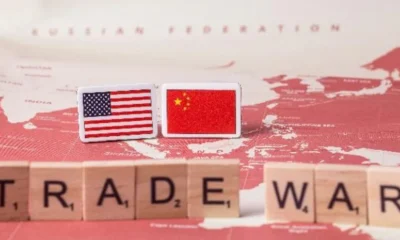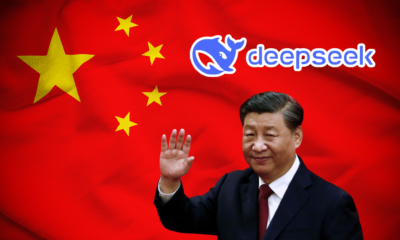Politics
Trump’s Major Action On Foreign Aid: Suspends All Aid Programmes Except For Israel And Egypt. What This Means For The World, How It Affects Ukraine. Will America’s Departure Make Room For China?
Published
9 months agoon

Trump’s Major Action On Foreign Aid
In a bold and controversial move, the administration of United States President Donald Trump has announced a suspension of nearly all new funding for foreign assistance programmes. Notably, this sweeping freeze spares only two allies, Israel and Egypt, along with emergency food programmes. However, health initiatives, including life-saving services, have not been granted the same exception.
This decision, communicated via the US State Department, marks a significant shift in the United States’ approach to foreign aid, which has traditionally been seen as a cornerstone of its global influence. With the US spending over $60 billion in foreign assistance in 2023—more than any other country—this abrupt policy change has far-reaching implications.
The Directive
The announcement came with a memo from newly confirmed Secretary of State Marco Rubio, instructing senior officials to ensure that “no new obligations shall be made for foreign assistance” to the fullest extent permitted by law. The freeze is set to last at least three months, during which Rubio is expected to decide whether to continue, modify, or terminate existing programmes.
Among the initiatives impacted is the President’s Emergency Plan for AIDS Relief (PEPFAR), a globally recognized health programme established in 2003 under President George W. Bush. PEPFAR has garnered bipartisan support for two decades and is credited with saving as many as 25 million lives. Despite its significance, the programme’s funding extension—which runs until March 2025—now faces uncertainty within the three-month freeze window.
Alarm from Humanitarian Organizations
The announcement has sparked immediate alarm among humanitarian groups, who warn that this suspension could heighten global instability and lead to significant loss of life.
Abby Maxman, head of Oxfam America said,
“By suspending foreign development assistance, the Trump administration is threatening the lives and futures of communities in crisis, and abandoning the United States’ long-held bipartisan approach to foreign assistance which supports people based on need, regardless of politics,”
Experts have also weighed in with dire predictions. Jeremy Konyndyk, a former official with the US Agency for International Development (USAID), described the directive as “lunacy,” warning, “This will kill people. I mean, if implemented as written in that cable … a lot of people will die.”

Exceptions. Israel and Egypt
While the freeze has raised concerns globally, aid to Israel and Egypt remains untouched. These two countries are among the largest recipients of US military assistance, despite facing criticism over their human rights records. The memo specifically mentions waivers for “foreign military financing for Israel and Egypt and administrative expenses, including salaries, necessary to administer foreign military financing.”
This preferential treatment has raised eyebrows, as many argue that the United States should leverage its aid to push for meaningful reforms in these nations.
Chaos Among Aid Organizations
The sudden freeze on U.S.-funded aid programs has left a trail of uncertainty and disruption across the globe. Agencies that depend on American funding are struggling with an abrupt halt in operations, leaving critical initiatives—such as HIV/AIDS treatment, maternal health care, and food security programs—in jeopardy.
A memo from Secretary of State Marco Rubio directed agencies to suspend activities pending a review of each program’s alignment with U.S. interests. The situation has been described as “manufactured chaos” by a former USAID official, noting the immediate risks to essential services.
In Ukraine, the freeze has already paused crucial projects like emergency maternal care and vaccination drives. The fate of these programs now hangs in the balance, awaiting the results of Rubio’s 85-day review period.
Why Israel and Egypt Are Exempt
The freeze notably spares military assistance to Israel and Egypt, indicating their strategic importance in U.S. foreign policy. Israel receives approximately $3.3 billion annually in military aid, while Egypt benefits from $1.3 billion.
This decision comes at a delicate time. The Gaza Strip urgently requires humanitarian aid following a ceasefire between Israel and Hamas, and crises like the famine in Sudan are escalating. Critics argue that these exemptions, while politically significant, show glaring inconsistencies in U.S. foreign aid priorities.
Ripple Effects on U.S. Influence
The freeze’s implications extend beyond immediate humanitarian concerns. Key allies like Ukraine, Taiwan, and the Baltic nations depend on U.S. military and development assistance to counter regional threats. The freeze has also cast uncertainty over Lebanon’s military support, crucial for regional stability.
Critics warn that these actions could erode U.S. credibility as a global leader in foreign aid. The review process initiated by Rubio leaves international partners unsure about the future of their collaborations with the U.S., further destabilizing an already volatile global arena.

Impact on Ukraine
Ukraine, in particular, finds itself at a critical juncture. While military aid—delivered through programs like the Presidential Drawdown Authority (PDA) and the Ukraine Security Assistance Initiative (USAI)—is not directly affected by the freeze, USAID-funded reconstruction efforts face significant uncertainty.
These programs, which include demining initiatives and rebuilding bombed energy infrastructure, are crucial for Ukraine’s recovery. The freeze also impacts USAID’s support for Ukrainian civil society and independent journalism, essential pillars of democratic resilience.
Notably, Ukrainian officials have expressed cautious optimism, citing funds previously secured under former President Joe Biden’s administration. However, the ambiguity surrounding the executive order has left many programs in limbo.
The Pentagon has clarified that military support for Ukraine remains unaffected, emphasizing that the freeze primarily targets development assistance. Still, critics argue that the move risks undermining broader U.S. commitments to Ukraine, particularly as the country continues its fight against Russian aggression.
Will America’s Departure Make Room for China?
The U.S.’s sudden freeze on foreign aid, driven by a directive from Secretary of State Marco Rubio, has sent shockwaves through the global aid ecosystem. This disruption has raised an unsettling question- as America pauses its role as a leading benefactor, will it leave a vacuum for China to fill?
The Strategic Chessboard
For decades, the United States has wielded foreign aid as a tool of soft power, strengthening alliances, stabilizing regions, and countering the influence of adversarial nations. However, the freeze on development programs and the uncertainty surrounding U.S. aid commitments could weaken this influence. In contrast, China, with its ambitious Belt and Road Initiative (BRI), has been positioning itself as a dominant player in global development.
China has long recognized the strategic value of investing in infrastructure and development projects across Africa, Asia, and Latin America. From railways in Kenya to ports in Sri Lanka, its investments have reshaped the economic and political landscape of these regions. While the U.S. debates its aid policies, China is likely to seize the opportunity to deepen its influence.
A Vacuum in Humanitarian Aid
One of the most immediate effects of the U.S. aid freeze is the suspension of critical humanitarian programs, including health, food security, and education initiatives. For example, paused vaccination programs in Ukraine or halted HIV/AIDS treatments in Africa could create openings for China to step in with its own solutions.
Beijing’s strategy often involves providing quick, tangible results—building hospitals, schools, and infrastructure—without the bureaucratic delays typical of Western aid. This pragmatic approach could endear China to countries desperate for immediate assistance.
Economic Diplomacy. China’s Winning Card
China’s economic diplomacy offers another significant advantage. While U.S. aid has traditionally come with strings attached—often tied to democratic reforms or human rights conditions—China’s aid is largely unconditional. This “no-strings-attached” policy appeals to authoritarian regimes and developing nations that are wary of Western scrutiny.
Moreover, China’s state-owned enterprises and financial institutions can rapidly mobilize resources to fill gaps left by U.S. aid, further consolidating its influence. Nations reliant on American development assistance may now turn to China, seeking not just aid but also trade partnerships and investments.
The Geopolitical Fallout
The implications of this shift extend far beyond individual nations. As China fills the void left by America’s retreat, it could reshape the global balance of power. Nations in regions like Africa, Southeast Asia, and even Eastern Europe may find themselves increasingly aligned with Beijing’s vision of a multipolar world order.
For instance, Ukraine, which relies heavily on U.S. support, might seek additional partnerships with China to maintain its reconstruction efforts. Similarly, countries in Africa facing stalled U.S. programs could pivot toward Beijing’s offerings, further embedding China’s presence on the continent.

Risks for America
The U.S. risks losing its soft power advantage and global leadership position. Critics of the aid freeze argue that this policy shift undermines decades of diplomatic goodwill and leaves the U.S. vulnerable to strategic setbacks. China’s ability to step into this void could diminish America’s influence in critical regions, weakening its ability to shape global norms and counter adversarial powers.
Moreover, the perception of the U.S. as an unreliable partner could push allies to diversify their alliances, strengthening China’s hand in multilateral forums. This could have long-term repercussions, not just for America’s foreign policy but also for its ability to champion democratic values on the world stage.
The Last Bit
America’s retreat from its role as a global benefactor could be a strategic blunder that plays directly into China’s hands. By pausing its aid commitments, the U.S. risks ceding influence to a rival power that is more than willing to step into the breach.
The 85-day review period may ultimately decide the fate of many U.S. programs, but the geopolitical consequences of the freeze of foreign aid could last far longer. As America pauses, China may make advances, recalibrating the global order in ways that may prove difficult to reverse.
Further, President Trump’s directive reflects a broader critique of the U.S. foreign aid apparatus, which he has accused of promoting destabilizing agendas contrary to American values. While the stated goal may be to reassess and prioritize aid allocations, the potential consequences—from humanitarian crises to geopolitical instability—are significant.
As the three-month review period unfolds, the world will be watching closely. The decisions made during this time will not only affect the lives of millions but also shape the United States’ role on the global stage for years to come.
You may like
-


Taiwan’s ‘Historic’ TSMC Deal, A Win Or The End Of Its ‘Silicon Shield’ As China Threatens? A Jittery Taiwan Watches Trump’s Moves On Ukraine, Wondering, Could We Be Next?
-


A Trade War That Just Won’t Quit. As Trump’s Tariffs Hit, China Stays The Course, For Xi’s Its Business As Usual Strategy
-


Indian Stock Market In Turmoil. Investors In Panic Mode, Is This A Temporary Correction Or The Start Of A Bear Market?
-


America And China’s Thirst For Gold In 2025 Is Draining Other Countries’ Reserves; Here’s Why?
-


Shakeup In The Auto Sector. Mercedes-Benz 15% Job Cuts, Nissan CEO Exit, And Germany’s Make-Or-Break Year
-


DeepSeek Ai Rush. China’s AI Contender Gears Up for Next Big Launch Even As It Gets Xi Jinping’s Blessings
